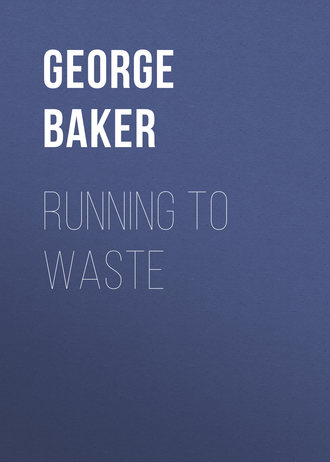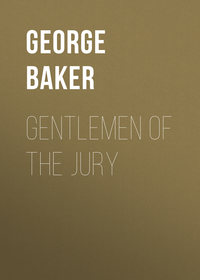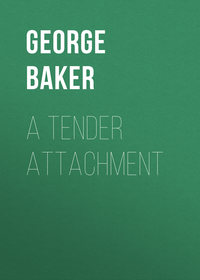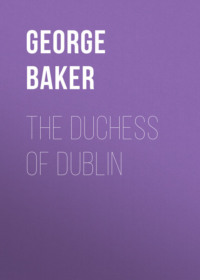 полная версия
полная версияRunning To Waste
Before the appearance of Becky, the captain had no intention of taking a journey.
“O, that will be splendid – if I only could.”
“You can, and shall. Go home, get ready, and to-morrow morning at five o’clock meet me at the school-house. Phil shall drive us over to Foxtown. We’ll take the cars there, and be in Boston at one. Here, take your money;” and the captain swept it from the desk, and put it in her hand. “When I want it, I’ll ask for it.”
“But how can I ever pay you?”
“By shaking hands, and being friends with the old man. You may add a kiss if you like.”
“A dozen!” cried Becky, throwing her arms about the captain’s neck. “You dear, good, kind, noble old captain!”
“Now, good by, little one. Be sure and be on time to-morrow morning at five.”
“When the clock strikes, you’ll find me there. Good by.”
Becky ran home with a happy heart, bounced into the sitting room, and told them all about it – Mrs. Thompson and Harry; then ran to her mother’s room, and told her; then to the kitchen, and told Aunt Hulda. And such a surprised household it would be hard to find.
Harry Thompson frowned, and was inclined to put a stop to the journey; but his mother looked happy.
“Our little witch has caught the captain. Do not interfere, for out of this friendship I foresee a happy day for you and me. ‘Let patience have her perfect work.’”
CHAPTER XII.
AMONG THE WOODPECKERS
Twenty years ago, in one of the busiest streets in bustling Boston, up three flights of stairs, sufficiently distant from the tumult of trade to escape its confusion, and near enough to the sun to receive the full benefit of its light, “John Woodfern, Designer and Engraver,” plied his artistic trade, in the enjoyment of a large share of public patronage. He was a man who held the foremost place in his profession, renowned for his skill in fastening the fine points and delicate shades of a drawing upon wooden blocks, whence are produced those pictorial illustrations which often adorn, and sometimes disfigure, books, periodicals, and papers. He was also a man of good business habits, and his establishment was neatly arranged, and conducted in the most orderly manner.
An Englishman by birth, he brought to this country, besides a clear head and skilful hands, a love for the roast-beef and ale of Old England, a warm heart, and a jovial temper, the latter somewhat obscured by the characteristic fogs of gruffness and blunt speech, without which no Briton would be content to leave his native land. He was a large, handsome man of fifty, with light, curly hair, surrounding a polished pate, in whose centre flourished a single tuft of hair; blue eyes, and a long, flowing beard.
His establishment was divided into two sections – his own office at the head of the stairs, and his work-room, from which he was only separated by a partition, and which he could overlook, through the door, from his seat.
The office contained a handsome book-case, a desk, and his own work-table, where he did the finest work. Its walls were adorned with fine pictures and specimens of his work. Over the desk was displayed, on brackets, a polished champion cricket bat, ornamented with a silver plate, on which glistened his name and the match in which it was won. On his table were the usual implements of his craft – a small stand with a padded leather cushion, a frame in which was fitted an eye-glass, a fine assortment of “gravers,” and blocks of wood in various stages of completion.
The work-room contained three tables, at which were seated three young men, with their eyes screwed down to eye-glasses, diligently pecking at drawings on wooden blocks. These young men, “woodpeckers” by trade, were Woodferns by name, being sons of the proprietor, and, like their father, all good fellows and skilful workmen. This room was plainly furnished with three tables and a transfer press, and above them a long shelf, on which were ranged a row of glass globes, filled with water, used to concentrate the light in night work.
Mr. Woodfern sat at his table, busily at work putting the finishing touches to a block, when unattended and unannounced, Miss Becky Sleeper marched into his presence.
Mr. Woodfern lifted his eye from the glass, and politely turned in his chair, with a nod to the visitor. The young Woodferns unscrewed their eyes from the wooden sockets in which they were imbedded, and very impolitely stared at the intruder.
“Good morning, sir,” said Becky, in her sweetest tones. “Will you be kind enough to look at these drawings?”
Mr. Woodfern scowled. He had been pestered by an army of aspiring draughtsmen, of both sexes; and the London fog was on him. He answered shortly, —
“No, I don’t want any drawings. Good morning,” turned in his chair and applied his eye to its artificial socket.
A wave of confusion rolled over Becky’s confident spirit. The gruff voice and the abrupt dismissal had not entered into her calculations. But she was not disposed to quit the field without a struggle, after so long a journey; so, gulping down her chagrin, she said, —
“But you don’t understand. I’ve come a long way to get work. My friends tell me I am competent, and I have specimens of drawing. You’ll surely look at them.”
“I shall do nothing of the sort,” said Mr. Woodfern, gruffly, not deigning to raise his eye. “I have all the draughtsmen I want; and I never employ girls.”
“Why, you give Miss Alice Parks work – don’t you?”
Caught. Mr. John Woodfern, how will you answer that question?
“I have given her work; and a precious sight of trouble she has made me.”
There was some comfort in that to Miss Becky’s jealous heart. Miss Alice was not quite a paragon, after all.
“Once for all, I don’t want your drawings. I’ve no time to look at them. Good morning.”
The tone was so chilling that a returning “good morning” trembled on Becky’s lips. The tears sprang to her eyes. It seemed to her for a moment that all was lost. But, remembering the friends she must meet with the story of her defeat, remembering the captain patiently waiting in the street for her return, she yet lingered, hoping that a little reflection might produce a change in the temper of this gruff proprietor, and gain her a hearing. Profound silence; eyes glued to their sockets; not even the tools of the workmen broke the stillness, for these woodpeckers tapped no hollow oak tree, but pecked at solid boxwood, which emits no sound. Her eyes roved about the room until they fastened on the cricket-bat above the desk. They glistened at the sight.
“O, what a splendid cricket-bat!” she cried.
“Is that yours, sir? Did you win it?”
Mr. Woodfern raised his head, with a faint show of interest.
“Yes, I won it. What do you know about cricket?”
“I know it’s just the most splendid game I ever played,” replied Becky, with enthusiasm.
“You play cricket!” said Mr. Woodfern, in surprise.
“Yes, indeed; but it was long ago. I was a famous hand at it, too, though I do say it. Please, sir, let me take it down. I won’t hurt it.”
“Certainly,” said Mr. Woodfern, rising from his chair. “Handle it as much as you like.”
He took it from its place, put it in Becky’s hands, and resumed his seat, watching the girl with a lively interest, for cricket was a passion with him age could not smother. Becky took the bat and handled it like a true cricketer, placing herself in graceful positions, to display her knowledge of its use.
“Now, if we only had a ball!”
“If we had! We have,” said Mr. Woodfern, opening a drawer in his table, and producing a cricket ball. “Now, what next?”
“Bowl me a ball, and you shall see,” replied Becky, placing herself before an imaginary wicket.
The sight of a cricketer in position was enough to excite the enthusiastic sportsman; and when Becky shouted, “Play!” without a moment’s thought he bowled a swift ball. Becky struck quick and hard; it flew across the room, into the work-shop, and struck a glass globe. There was a crash, and the imprisoned water poured on to the head of the youngest woodpecker in a miniature deluge. He sprang up, shouting, “Help, help!”
“Gracious! what have I done?” faltered the terrified Becky.
Mr. Woodfern colored to the tuft of the oasis in the bald desert on his head, but quietly rose, shut the door between the two rooms, and resumed his seat.
“It’s of no consequence. Let me see your drawings.”
So out of the old life a second time had come her deliverance in time of trouble. Not altogether wasted, after all.
Mr. John Woodfern took the proffered portfolio and placed it in his lap. As he did so his eyes met Becky’s, and the comical situation in which he had been placed overpowered him. He threw himself back in his chair, and burst into a prolonged, loud and hearty peal of laughter. Having thus effectually dissipated the fog he opened the portfolio, and examined its contents.
“So, so; this is your work – is it? Very good, fine, excellent! You had a good teacher, that’s evident; but you have talent, that’s still more evident. Who is your teacher?”
“Harry Thompson, sir,” replied Becky.
“Harry Thompson of Harvard?” queried Mr. Woodfern.
“He was at Harvard, sir. He’s now at Cleverly – Cleverly, Maine; that’s where I live,” said Becky.
“Indeed! It’s my old friend. He’s your teacher at cricket, too, I’ll be bound. Why didn’t you tell me this before?”
“If you’ll be kind enough to remember, sir, you were very busy when I came in. You didn’t give me a chance to tell you anything,” said Becky, taking a mischievous pleasure in reminding the engraver of his brusque behavior.
“Hem, hem; that’s so. I was busy, very busy, Miss – Miss – what’s your name?”
“Rebecca Sleeper, sir. Harry calls me Becky.”
“Well, Miss Becky, I like your drawings; but the fact is you’ve had no experience in drawing on wood.”
“But I could learn, sir,” said Becky, quickly. “If you only knew how much need I have of money, you would give me a chance – I know you would.”
At this moment the door opened, and a young lady made her appearance. She was taller than Becky, but young and graceful, with a bright, handsome face, lustrous black eyes, and a profusion of dark ringlets.
“Good morning, Miss Parks,” said Mr. Woodfern, courteously.
Becky started, and stared at the visitor – Harry’s paragon. It must be; it could be no other.
“Good morning, Mr. Woodfern,” said Miss Parks, gayly. “It’s the day after the fair, I know; but you will forgive me. I couldn’t finish them in time.”
The young lady unfastened her reticule, and produced three blocks, which she laid before the engraver.
“Forgive you?” said Mr. Woodfern. “I don’t know about that. Five minutes more, and you would have been superceded by this young artist;” and he pointed to Becky.
Miss Parks looked at Becky, and Becky looked at Miss Parks.
“Miss Parks,” said Mr. Woodfern, “this is Miss Rebecca Sleeper, of Cleverly.”
A flush of surprise overspread the features of Miss Parks.
“Miss Rebecca Sleeper of Cleverly! Why, it must be Harry’s Becky. You dear little thing! how glad I am to meet you!” and she advanced with outstretched hands to Becky.
Becky met her advances with cordiality, though the appellation of “dear little thing” from a stranger somewhat surprised her.
“Harry has told me all about you. His letters are full of praises of you; and I know all about the adventure in the mill-dam, and the burning of the mill. We must be good friends.”
So Harry wrote to her. She must be a very, very dear friend, then; too dear for her peace of mind. The old jealous feeling crept into Becky’s heart, so heavy that she could scarcely hold back her tears; but she did, and answered nervously, —
“Yes; and I’ve heard a great deal about Miss Alice Parks. I’m glad I met you. It will please Harry to know that I met his dear friend.”
Becky didn’t mean to emphasize the “dear” so strongly; but she noticed it brought a flush to the face of Alice Parks. It was rather confusing, and the two young ladies stood looking at each other in silence.
“Miss Sleeper wants work. She has brought me these sketches. Take a look at them,” said Mr. Woodfern, handing the portfolio to Miss Parks.
The young lady took it, and, seating herself at the desk, immediately became interested in the drawings. Just then the door of the work-room opened, and Mr. George Woodfern entered the office. He was a tall, handsome fellow, the image of his father. On his entrance, Miss Alice Parks raised her head quickly.
“Good morning, George,” she said, “come and look at these drawings, and confess I’ve found a rival at last.”
George Woodfern crossed the office, with a quick step and a blushing face, and joined Miss Alice. The two put their heads together over the drawings, with such evident pleasure in each other’s society, that had Alice not been such a dear friend of Harry’s, Becky would have made a match on the spot. Their conference was long and earnest; and from their conversation Becky was convinced that they were pleased with her drawings. In the meantime Mr. Woodfern made himself agreeable to Becky, showed her how drawings were reversed on wood, and gave her many hints regarding “shading,” “filling in,” and the nice points of wood engravings. The young couple at the desk at last finished their examination.
“Well, Miss Alice, what is the verdict?” asked Mr. Woodfern.
“Employ the young lady, by all means; though I fear ‘Othello’s occupation’s gone,’ as far as I am concerned. She can draw ever so much better than poor I.”
Becky blushed with pleasure. So Harry’s friend was her friend too. Mr. Woodfern took from his drawer the manuscript of two short stories and a poem. He then selected three blocks of boxwood from a row on his table, and placed the whole in Becky’s hands.
“Miss Sleeper,” he said, “on the recommendation of this talented young lady, I shall give you a trial. There are two stories for children, and a short ‘baby’ poem. The points to be illustrated are all marked. Take them, consult your friend Harry Thompson, and if you send me three satisfactory drawings within a fortnight, I will send you my check for fifteen dollars. If not satisfactory, I pay nothing.”
Becky’s heart thrilled. How kind, how good of Mr. Woodfern! She thanked him warmly enough, but the words seemed a long way off from the thanksgiving that glowed in her heart. Mr. Woodfern turned away abruptly, and entered the work room.
“Now come over here and let me give you a few hints from an experienced hand. We shan’t want you any more, George.”
George Woodfern laughed, and in turn departed to the privacy of the work-room; and the two young ladies were left to their own deliberations.
All this time Captain Thompson was patiently sitting in a carriage at the entrance, awaiting the return of his charge. On the arrival of the train in Boston at one o’clock, he had taken a carriage and driven to the engraver’s. He had been anxious to participate in the interview; but Becky, fearing his quick temper might cause trouble, had prevailed upon him to allow her to be the sole carver of her fortunes with the wood carver. Thus far the peppery captain had enjoyed this, to him, new sensation hugely. The bright, cheerful, happy demeanor of the girl, her intelligent and witty conversation, her delight in the fresh experience of the day, had made him really happy; and his warm heart bubbled up through its rough exterior with desires to still further gratify her wishes.
And so he waited patiently a long hour for her return. She came bounding down the stairs, and leaped into the carriage, her face rosy, her eyes bright with triumph.
“It’s a success, captain. I’ve conquered, and I’m carrying home lots of work.”
“Of course you’ve conquered. I knew you would; and we’ve done it without their– her – help, too,” said the captain, chuckling with triumph. “Now let’s see – we’ve got two hours for dinner and a drive; and then back to Cleverly.”
They drove to a hotel, had an excellent dinner, took the carriage again, and Becky was shown the Boston sights, all of which were new revelations to the country girl, whose delight made the old captain’s heart glow and glow again.
In due time they took the train for Foxtown, and then Becky related her adventure, in the course of which Miss Alice Parks appeared upon the scene.
“She’s a dear friend of Harry’s – your Harry, captain. I shouldn’t wonder if one of these days she should become his wife.”
Becky said this bravely. The captain could not know what a throb of pain darted through Becky’s bosom at the thought.
“Become his wife! Nonsense! What are you thinking of, Becky?”
The captain looked fierce and angry, and Becky saw it.
“Well, all I know, he calls her his dear friend, and she calls him her dear friend, and they write to each other; and that’s the way lovers do – don’t they?”
The captain stared out of the window, moving uneasily in his seat, snapping his teeth together very often, all of which Becky saw and took advantage of. A wild scheme had crept into the girl’s head. Harry and Harry’s mother had done much for her; it was time she should repay it. The captain had a wilder scheme in his head, and was in exactly the right mood to combat the proposed alliance.
“He marry this girl! I’d like to see him attempt it! I’d like to see him attempt it!”
This came involuntarily from the captain’s mouth after a very long silence.
“Why, captain,” said Becky, “she’s a splendid girl, and so smart with her pencil! And if they love each other,” – here she gave a gulp, – “I’m sure it’s only right that they should marry. And then Harry’s so good! O, it would be wicked to prevent his happiness. You won’t – will you, captain?”
The captain said nothing, but grew more and more uneasy; said nothing, but thought, thought hard. What could he do? He had cast the boy off; he was his own master. He had no power to accomplish the wish that was in his mind.
“O, if you only knew how good and kind Harry has been to me, you would never desire to break his heart.”
Here Becky broke down, and commenced sobbing. The captain started, put his arm about Becky, and drew her head to his breast, still looking out of the window, and saying nothing.
Becky’s weeping was of short duration; there was too much at stake; and so, still lying on the captain’s breast, with his arm about her, softly and gently she spoke of Harry; of his kindness to her; of his brave deeds; of the love he had gained from all who knew him; of his devotion to his mother; rehearsed incidents in his college life; brought out of his boyhood history little scraps of goodness so carefully treasured in her grateful heart. If she had been pleading for Harry’s life, she could not have been more earnest and determined in the recital of his virtues. And the captain sat there, listening, saying nothing; and the little pleader babbled on, unaware that at the captain’s heart the old obstinate roots were being plucked from their bed; that the warmth of his new love was flowing in thawing out the long-frozen channel of paternal affection.
The cars reached Foxtown, and still the captain said nothing. The carriage was in waiting, and an hour’s ride took them to Cleverly. The captain was silent all the way. Phil drove straight on to the Sleeper house. It was twelve o’clock. There was a light in the sitting-room. At the sound of wheels, Mrs. Thompson came to the door. The curtain was drawn aside, and Becky saw Harry peering out into the darkness. She jumped from the carriage.
“Won’t you come in, captain?” said Becky.
The captain shook his head.
“I shall come up to see you to-morrow, to thank you for being so kind to-day. O, I’ve had a splendid time. Good night.”
She approached the carriage, and held out her hand. The captain grasped it.
“I shall come up to-morrow, captain. Shall I come alone?”
Becky’s voice trembled. She had been trying hard for a triumph. She feared she had failed.
“No, Becky, no. God bless you, child! Bring him with you; bring Harry home!”
Phil Hague drove off down the hill at a lively rate, Uncle Ned being started into a gallop, by an Irish howl, which might have been heard a mile off.
“Bring Harry home!” Becky heard it; Mrs. Thompson heard it; Harry heard it. She had triumphed, after all – this little girl, whom Mrs. Thompson folded to her bosom, whom Harry clasped by the hand. Mother and son might well be happy. Reconciliation at last. But for Becky, happiness supreme. She had accomplished this, and hers was the hand commissioned to bring Harry home.
CHAPTER XIII.
DELIA SLEEPER’S SHIP COMES IN
Becky received the warm thanks and congratulations of the happy mother and son with a grateful heart. She had been enabled to repay, in some part, the love and care they had bestowed upon her. She had conquered the stubborn father, and lifted the cross from the shoulders of the patient wife. But she felt that she had been but an instrument shaped by their hands for the work, and to them she unselfishly gave the credit of her triumph. Not all, however; one other, who had been her counsellor and guide; one to whom all her thoughts and actions had been confessed; one who, with almost supernatural wisdom had taught her wayward feet to tread the path of duty; who out of her own needs, had sought peace in the boundless love of a heavenly Father, and had brought her child into the same tender embrace, – the stricken mother, who for two long years, helpless upon her bed, had borne all so meekly and patiently; to her the grateful daughter gave a generous share of the glory which surrounded this unexpected reconciliation.
That night mother and daughter shared the same couch. Aunt Hulda, who had a great antipathy to strange beds, banished herself from her accustomed pillow without a word of complaint, glad to make the child, who had wound herself about the queer spinster as no other had ever been able to, happy at any cost. Alone with her mother, Becky’s tongue flew fast and furious with the recital of her wanderings and workings, until the weariness of the long, strange day overpowered her nimble organ of speech. In the middle of a sentence, she dropped asleep, her mother’s hand fast clasped in hers, all forgotten, even her accustomed prayer unspoken. But it lay there in the warm, beating, affectionate heart, and the mother’s lips bore it to the heavenly throne, joined to her own earnest plea that blessings from the Unseen hand might strew the path of life with much of happiness for her own precious child.
Having eased his unhappy conscience of the heavy load it had borne so long, the conquered captain went home in a dazed sort of amazement at the act which he had committed. He could not regret it, would not have recalled his words had he the power. There was a warming up of his stubborn spirit when he thought of the girl who had so craftily spread for him the net in which he had been captured, but no desire to loose his bonds, and escape. It was all for the best; they would be a happy family after the first meeting. But the first meeting bothered the captain. What could he say to this son who had been shut out from home so many years? It was a serious question, and one he could not readily answer. He went home thinking about it: went to bed, still thinking; and at last fell asleep, to dream of it.
Mrs. Thompson came home, escorted to her door by Harry; said “Good night,” with a happy heart, – it was to be their last parting in this strange manner; was not surprised to find her husband missing when she entered the sitting-room, nor surprised to find him snoring when she entered the sleeping-room, but had a quiet laugh to herself as she thought how ashamed the captain tried to appear of his good actions. She would not disturb him for the world; said nothing to him of the last night’s work, the next morning, as he fidgeted at the breakfast table, and looked everywhere but in her face.
The captain did not leave the house, but gave his whole attention to the preparation of the speech with which he was to meet his long-absent son. On one thing he was determined – he would be a father still. He had been disobeyed; it was for the son to ask pardon. He would be cool, dignified, collected. He watched the bridge road uneasily. At half past eight he saw Becky leave the gate with her school-books in her hands, and after came Harry. He left the window at once. It was coming; it would soon be over. He sat on the sofa, covered his eyes with his hand, and waited. He did not need to look – he felt their coming. Now they were on the bridge; now they had passed the school-house, were crossing the road, were at the door. Yes, a ring! Mrs. Thompson rose from her chair, looked at her husband, with his face hidden, smiled, and passed into the entry. Be a man, captain; be a father, cool, dignified, collected! The door opened; the captain rose to his feet.









